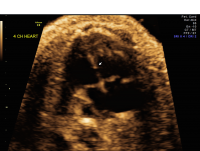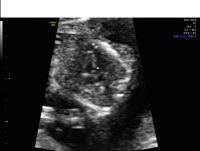Ventricular Septal Defect (VSD)
What is ventricular septal defect?
Ventricular septal defect (VSD) is an opening in the ventricular septum, which is the muscle between the left and right ventricle. VSD occurs in about three to five per 1,000 live births, accounting for 30 percent of all congenital heart defects. It is the most common birth defect involving the heart.
How is this condition managed during pregnancy?
When a VSD is suspected, further evaluation includes a specialized evaluation of the fetal heart (fetal echocardiogram). As genetic abnormalities may be associated with this finding, genetic counseling and testing are recommended. Prenatal consultation with a pediatric cardiologist is recommended to discuss the prognosis and management after birth. In severe cases that are likely to require surgery, prenatal consultations with a pediatric cardiothoracic surgeon and neonatologist will be arranged. In more severe cases, prenatal care will be managed by a maternal-fetal medicine specialist, an obstetrician with special training and expertise in high-risk pregnancies.
How is this condition managed after delivery?
Outcomes with VSD vary widely and are influenced by the presence of other abnormalities or genetic syndromes. Isolated VSD diagnosed prenatally has a good clinical prognosis.


